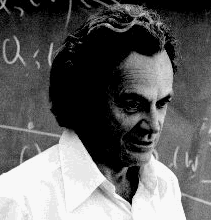Opinion
March 5, 2006
Surely You're Joking, Ms Bishop
The Minister Goes to Science
Meets Parliament
|
 The
very afternoon I arrive in Princeton [as a first year gradate student] I'm
going to the dean's tea, and I didn't even know what a "tea" was or why! I
had no social abilities whatsoever; I had no experience with this sort of
thing. The
very afternoon I arrive in Princeton [as a first year gradate student] I'm
going to the dean's tea, and I didn't even know what a "tea" was or why! I
had no social abilities whatsoever; I had no experience with this sort of
thing.
[After being greeted at the door by Dean Eisenhart] I go through and there
are some ladies, and some girls, too. It's all very formal and I'm
thinking about where to sit down and should I sit next to this girl, or
not, and how should I behave, when I hear a voice behind me.
"Would you like cream or lemon in your tea, Mr. Feynman?" It's Mrs.
Eisenhart, pouring tea.
"I'll have both, thank you," I say, still looking for where I'm going to
sit, when suddenly I hear a [chuckle], "Surely you're joking, Mr.
Feynman."
Richard P. Feynman |
On February 28 the Minister for Education, Science and
Training, Julie Bishop, addressed the 7th annual Science Meets
Parliament -- an annual function put on by the Federation of Australian Scientific and
Technological Societies (FASTS) to bring together a representative cross
section of Australian scientists, engineers, and technologists, with members of
the federal parliament in order to establish a greater understanding and
appreciation of STEM (science, technology, engineering and mathematics) by our
democratically elected members of government.
A feature of these meetings is a luncheon address by the Minister for Education,
Science and Training to the FASTS' members attending the two day meeting.
On this occasion the Guernsey was worn by the minister for a month, Julie Bishop, a
solicitor and barrister by training. She told her audience:
In a world which
sees scientific research as the key to global leadership in opportunity and
innovation, it is indeed a race to the top. Iím determined to push forward
with the Governmentís progressive agenda for science and innovation, to
ensure that Australia records at least a personal best in any race to
achieve socio-economic prosperity.
And as an explanation as
to why she is a parliamentarian:
I was brought up to
believe that entering public office is, in fact, one of the highest
callings, and that if youíre given the opportunity to direct your abilities,
your energies, to the betterment of your state, or your country, then thatís
perhaps one of the most worthwhile contributions you can make.
Ms Bishop then
proclaimed a number of the viewpoints she champions:
I can think of few
other areas that have a more profound and direct impact on the lives of so
many people, particularly young people, than education, science and
training. Teaching and learning and research are the fundamental, the
essential, the enduring foundation blocks upon which our society is built.
...in my first
speech to the Federal Parliament in November of 1998, I highlighted the
importance of education and training in ensuring equality of opportunity for
Australians. I said that Australians needed to be equipped with an enhanced
knowledge base through education, as intellectual capital would be our key
to prosperity and stability and that flexible and transferable skills will
be a great human resource in our society. I stand by these statements.
This is a world in
which you have to run just to stay in the same spot. But of course, just
keeping up isnít good enough in this contest, we need to advance, and, given
our size, we need to be twice as good at what we do.
Now, more than ever,
the prosperity of Australia depends on education, on science and innovation,
and on building and maintaining a world-class skills base. The excellence of
our schools, our universities and our research institutions is central to
our capacity to engage globally, both through collaboration and competition.
But before you flip your
lid for joy, take notice of the context within which these fine sentiments are
fettered:
Iím committed to
taking forward the Government's reforms in higher education and research
with a focus on quality, excellence and the impact and outcomes of research
through Backing Australiaís Ability and Backing Australiaís Future
and more recent developments such as the Research Quality Framework
and the National Collaborative Research Infrastructure Strategy.
No mention of the Higher
Education Workplace Relations Requirements which no doubt
will engender great improvements in the quality of teaching and research at
Australian universities.
Then later three sentences
whose juxtaposition must have bemused her listeners:
Itís clear that
there are high levels of investment in national innovation strategies around
the world. While we may not hope to manage similar magnitudes, we can remain
in the race if we are bold and imaginative in our efforts. We need to remain
a globally competitive world class science and innovation based economy, for
if we fall behind we risk losing not just our global share of new ideas and
new technologies, but our capacity to attract high calibre students and
researchers to our country.
Ms Bishop appears to be
telling her audience, "As long as you guys can do it on the cheap, she'll be
apples." She then follows the approach used by Brendan Nelson in quoting
sums as to how much money the government is allocating for various projects:
With funding of some
$300 million from the decade 1999 through to 2009, the government continues
to support a range of professional development activities through the
Australian Government Quality Teacher Programme, which includes teachers of
science and maths.
The government has
allocated new higher education places from 2005, and that includes 1,700
teaching places throughout the sector. Weíve
|
|
|
Minister for Education, Science and Training,
Julie Bishop |
established the $33.7 million
Australian School Innovation in Science, Technology and Mathematics (ASISTM)
Project.
Fine. Meanwhile the
enabling sciences are being decimated while university infrastructure continues
to degenerate. If a nation doesn't adequately support its tertiary education
sector, secondary and primary education declines (as in who teaches the
teachers). In short a downward educational spiral is inevitable. But Ms Bishop
continued:
Of course, adequate
investment in innovation and creativity is another critical component of
Australiaís capacity to compete. We recognise that it is our scientists and
researchers who will help us understand and address the economic, social and
environmental challenges we face now Ė and are likely to face in the future.
The Australian Governmentís commitment to building a world class innovation
system is admittedly and unashamedly ambitious.
It hasn't been
adequate for over thirteen years. And there's no indication that it's gonna change now?
In August 1993 there was
sent to the then Minister for Employment, Education and Training, Kim Beazley, a
report from the National Board of Employment, Education and Training,
Higher Education Research Infrastructure .
The principle recommendation was that there should be an immediate injection of
an additional $125 million per annum of commonwealth funding to upgrade
university research infrastructure (i.e. an increase of 37%). Allowing
for inflation and purchasing power parity for the sector that would translate to
somewhere between $200 - $250 million per annum today.
.
The principle recommendation was that there should be an immediate injection of
an additional $125 million per annum of commonwealth funding to upgrade
university research infrastructure (i.e. an increase of 37%). Allowing
for inflation and purchasing power parity for the sector that would translate to
somewhere between $200 - $250 million per annum today.

By
the time the recommendation should have begun to be implemented the Howard
Coalition had been elected and the NBEET recommendations were ignored -- and the
downward slide of commonwealth support has continued.
For
some reason when Dr Nelson and now Ms Bishop trot out their figures, they
neglect to mention the historical context in which the amounts should be judged.
There followed more
selected figures used not for illumination but for support. Clearly the same
guys at DEST are dredging up the same material given her predecessor. Perhaps Ms Bishop might take
home the NSB's 2006
Science and Engineering
Indicators together with a twelve page companion,
America's Pressing
Challenge - Building a Stronger Foundation. to get some perspective
of just what is needed if Australia is not to "just keeping up," because it
"isnít good enough in this contest, we need to advance, and, given our size,
we need to be twice as good at what we do."
That almost throw away
line in
America's Pressing Challenge - Building a Stronger Foundation noting that
in the advanced physics assessment, U.S. students tied with Australia for the
lowest score ought to give pause but --
then Ms Bishop gets
to the Research Quality Framework:
I am currently
considering the advice that the Expert Advisory Group have provided.
Although itís complex, the payoff from the RQF will benefit all Australians.
Since there is no
evidence that that will be so, we must assume it is being taken as an article of
faith - perhaps Moses was given a third tablet on Mt Sinai as an appendix to the
ten commandments that we've just not known about
previously.
Alex
Reisner
The
Funneled Web
 The
very afternoon I arrive in Princeton [as a first year gradate student] I'm
going to the dean's tea, and I didn't even know what a "tea" was or why! I
had no social abilities whatsoever; I had no experience with this sort of
thing.
The
very afternoon I arrive in Princeton [as a first year gradate student] I'm
going to the dean's tea, and I didn't even know what a "tea" was or why! I
had no social abilities whatsoever; I had no experience with this sort of
thing.
